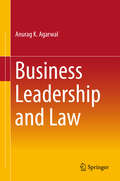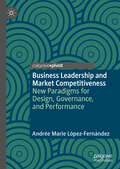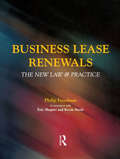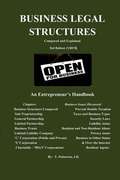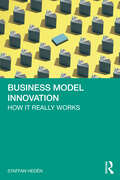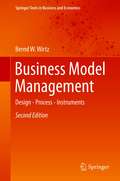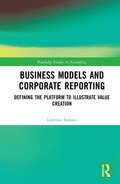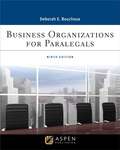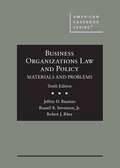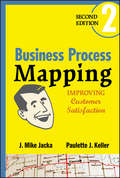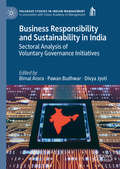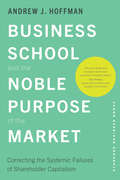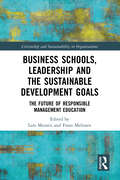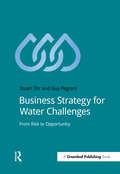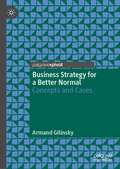- Table View
- List View
Business Leadership and Law
by Anurag K. AgarwalThis book discusses doing business and making profit on the right side of the law. It explores the role of aligning business and legal strategies, and using the law as a powerful tool in making businesses successful. In this unique book, the author draws on his experience teaching future business leaders at the IIM Ahmedabad for more than a decade. Numerous case studies from across the globe and involving top-notch companies are discussed from both the business leadership and legal perspective, with takeaways included at the end. Intended for senior managers who would prefer to have the law as their friend, philosopher and guide, the book offers analyses of judgments from various courts, but mainly from the Supreme Court of India and the US Supreme Court, and provides judicial finality on several issues commonly faced by business leaders. As such, it serves as a valuable reference guide for senior business managers aspiring to take on top leadership positions.
Business Leadership and Market Competitiveness: New Paradigms for Design, Governance, and Performance
by Andrée Marie López-FernándezCompetitive paradigms, which are constantly being shifted, and turbulent environmental conditions, which today are a constant, tend to dictate rather than inform strategic decision making regarding an organization’s status quo and desired outcomes. As such, there is a need for organizational leaders to re-examine current practices. This book provides insight into business dynamics and the internal and external factors that, when strategically aligned, provide satisfaction, added value, and enhanced performance.
Business Lease Renewals
by Eric Shapiro Philip Freedman Kevin SteeleEvery surveyor, property manager and lawyer who deals with commercial property needs to have a thorough knowledge of Part II of the Landlord and Tenant Act 1954, which governs the rights of business tenants to obtain renewals of their leases. A maze of complex and carefully interlocking provisions, the Act was radically amended by a Regulatory Reform Order as from 1 June 2004.These changes include:•widening the scope of protection•removing traps for tenants such as the counter-notice•changing the rules about court applications•amending the basis of assessing interim rent•imposing tougher requirements for giving information•creating new procedures for contracting out of the Act•a raft of new prescribed formsThis new book gives a clear explanation of the workings of the amended Act, keeping the framework in view while delving into the detail whenever needed. The old law is included for those situations where it may still be relevant. Written by a property lawyer assisted by a chartered surveyor and a property litigator, this publication, in addition to setting out the law, gives detailed guidance on practice for surveyors, managers, valuers, expert witnesses and property lawyers.
Business Legal Structures: An Entrepreneur's Handbook
by T. PattersonWhat form is best for your business? Should it be one of the corporate forms or one of those that is not a corporation? <P><P>This text will give you the facts and the comparisons that will help you make that choice. It should at the very least, give you the basic information so you can understand the issues that affect that choice. In addition, this writing is intended to list the basic information about US business structures every attorney and CPA wishes his or her new client already understood when first seeking help turning a worthwhile business plan into a smooth running profit making machine. The table of contents lists the types of business legal structures available to the entrepreneur for doing business in the US. Note that business structures have either a "corporate" and "non-corporate" legal form. Take a "quick look" at the comparison of business types appearing in Chapter 1: Business Entities Compared. <P><P>It is an easy to understand summary of the major considerations in choosing a form for a business. That page, for each type, lists the owner; personal liability; taxation and management features of each type. The later chapters of this writing discuss the details and the major issues that apply to each of business legal structure listed in that first chapter. All USA businesses are legal entities authorized defined, created, and registered according to the individual state laws of the state where the business is located. Although similar, there are important differences among the states. A great deal of "shopping" for a favorable "home" does in fact take place because of those differences. <P><P>However, there is a requirement for all businesses to "register" in any state where it has operations. That subject is the subject of Chapter 15: Doing Business in Other States. The appendix provides links to all 50 state departments Involved in forming a business. It includes all state's secretary of state business records departments; state taxation departments; security departments; and corporate and business laws.
Business Lobbying and Trade Governance: The Case Of Eu-china Relations (European Administrative Governance)
by Jappe EckhardtThis book provides an innovative account of how the globalization of production and the emergence of global value chains impacts on trade preferences, lobby strategies and the political influence of EU firms. It sheds new light on the complex EU-China trade relations.
Business Model Innovation: How it really works
by Staffan HedénBased on the author’s 30 years of consulting experience and validated by doctoral research, this book focuses on creating profitable growth with business model innovation in medium and large companies. Arising from an increased need for systems thinking and technological development, there is a common understanding that a business model should primarily create, develop, and retain value for companies' customers. But increased globalization and resource constraints have led to a difficult balancing act when addressing the challenges of achieving profitable processes and long-term growth. This book provides a new framework, based on six central themes with five related success factors each, to enhance opportunities’ visibility, contribute to improved margins, increase awareness of a company’s unique strengths and weaknesses in overall resources, manage risk, and optimize implementation of a new model throughout an entire organization. Owners, board members, and managers of medium and large companies worldwide, as well as advanced business students, will appreciate this detailed, practical, and clarifying approach to business model innovation.
Business Model Management: Design - Process - Instruments (Springer Texts in Business and Economics)
by Bernd W. Wirtz“How are business models purposeful designed and structured? How can the models be implemented professionally and managed successfully and sustainably? In what ways can existing business models be adapted to the constantly changing conditions? In this clearly structured reference work, Bernd W. Wirtz gives an answer to all these issues and provides the reader with helpful guidance. Although, ‘Business Model Management’ is first and foremost a scientific reference book, which comprehensively addresses the theory of business models, with his book Bernd W. Wirtz also turns to practitioners. Not least, the many clearly analyzed case studies of companies in different industries contribute to this practical relevance. My conclusion: ‘Business Model Management’ is an informative and worthwhile read, both for students of business administration as a textbook as well as for experienced strategists and decision makers in the company as a fact-rich, practical compendium.” Matthias Müller, Chief Executive Officer Porsche AG (2010-2015), Chief Executive Officer (2015-2018) Volkswagen AG“In dynamic and complex markets a well thought out business model can be a critical factor for the success of a company. Bernd Wirtz vividly conveys how business models can be employed for strategic competition and success analysis. He structures and explains the major theoretical approaches in the literature and practical solutions in an easy and understandable way. Numerous examples from business practice highlight the importance of business models in the context of strategic management. The book has the potential to become a benchmark on the topic business models in the German-speaking world.” Hermann-Josef Lamberti, Member of the Board Deutsche Bank AG 1999-2012/ Member of the Board of Directors, Airbus Group “The business environment has become increasingly complex. Due to changing conditions, the executive board of a company is confronted with growing challenges and increasing uncertainty. Thus, a holistic understanding of the corporate production and performance systems is becoming more and more important. At this point, Bernd W. Wirtz introduces and presents the concept of the structured discussion of the own business model. Business models present operational service processes in aggregated form. This holistic approach channels the attention of management, supports a sound understanding of relationships and facilitates the adaption of the business to changing conditions. The management of business models is thus an integrated management concept. Through the conceptual presentation of complex issues the author makes a valuable contribution to the current literature. In particular, the referenced case studies from various industries make the book clear and very applicable to practice.” Dr. Lothar Steinebach, Member of the Board, Henkel AG 2007-2012/ Supervisory Board, ThyssenKrupp AG
Business Models and Corporate Reporting: Defining the Platform to Illustrate Value Creation (Routledge Studies in Accounting)
by Lorenzo SimoniThis book discusses the role of business models in corporate reporting. It illustrates the evolution of non-financial reporting, the importance of business model reporting, and the main conceptualisations of business models. It also offers a methodological contribution to the assessment of business model reporting. Finally, it discusses the main implication of business model reporting for different categories of subjects and some challenges related to this kind of disclosure. Readers will understand the role of business models in the non-financial reporting landscape. They will also gain an understanding of how business models can help users of the annual report contextualise other non-financial items disclosed. However, effective business model reporting implies paying attention to certain features that define its quality. This theme is discussed in the empirical part of the book and in the section devoted to implications for preparers, users, and regulators. As large companies in the EU and the UK have to disclose the business model in the annual report, this book will be of interest to preparers and users of financial statements, regulators involved in the ongoing non-financial regulatory process, and professional bodies. It will also be of interest to academics interested in the investigation of non-financial reporting.
Business Models in the Circular Economy: Concepts, Examples and Theory
by Roberta De AngelisThis book focuses on the role of corporations in the transition towards an economy that works more in line with ecological limits. It is centred on business model innovation in the context of the circular economy, which is gaining consensus across business, policy and academic circles by proposing more resource efficient industrial processes. Interest in circular business models is growing within academic and practitioner literature yet the concept is not clearly understood, with potential negative consequences for theory building and practical implementation. Therefore, this book conceptualises circular business models and investigates their theoretical foundations in relation to the rationale for adopting them, drawing on circular economy, business model, strategic management and neo-institutional literature and secondary data.
Business Negotiations and the Law: The Protection of Weak Professional Parties in Standard Form Contracting (Young Feltrinelli Prize in the Moral Sciences)
by Carlotta RinaldoBusiness Negotiations and the Law: The Protection of Weak Professional Parties in Standard Form Contracting aims to explore the issues surrounding contract negotiations between entrepreneurs and other professionals when one of the parties does not have the same level of bargaining power as the other. The need to protect weaker parties from unfair contract terms exists not only in relationships between businesses and consumers, but in business to business contracts also. This book focuses on the problem of small enterprises, independent contractors and other professional weak parties and examines these from a European point of view. There are significant differences between Member States as to decisions regarding regulatory context on the protection of weaker professional parties in asymmetrical contractual situations. However, European businesses are overwhelmingly smaller in size, so protecting weaker parties becomes key in facilitating successful and efficient negotiations. The book provides a critical and comparative overview of the area and recent regulatory developments, both to clarify the direction that European legislation is heading, and to explore the tools needed to assure the effectiveness of the common market. This text will be of interest to policy makers, researchers of European legislation, and students of commercial and business law.
Business Networks Reloaded
by Stefanie Jung Peter KrebsBusiness networks are an important economic phenomenon of increasing practical importance throughout Europe. This volume examines business networks from an interdisciplinary perspective, with many contributions dealing with a certain form of business network, the so-called cooperative or non-hierarchical. With regard to this specific form of cooperation the volume presents new economic findings, proposes a definition and discusses the governance structure of those networks.Moreover, this book explores whether the research results can also be applied to hierarchical, centralized business networks. With medium-sized companies and all the more with large companies, business networks also pose the question of the compatibility with anti-trust law. This collection dedicates three contributions to this important question. They are complemented by chapters on liability of the network and its members towards third parties and contributions discussing duties of loyalty and the interpretation of agreements. Drawing on new research from Italy, Spain, Germany and Norway, this work illustrates the European legal perspective on business networks.
Business Organizations
by Theresa A. Gabaldon Christopher L. SagersBusiness Organizations, Third Edition is a pedagogically rich book that recaptures student engagement in the course without sacrificing basic rigor. The traditional coverage of most books in the field is retained, but modernized in reflecting the importance of unincorporated entities and small business counseling problems. Transaction-oriented problems put the student in the practice role of advising a variety of businesses. An expository approach provides clear context for cases. <p><p>Features include flowcharts, connections boxes, self-testing exercises, an interspersed series of exercises on ethics for business lawyers, a glossary of terms, and sidebars on numerical concepts and skills. Through the use of sidebar explanations or otherwise, the chapters or major sections of chapters in the book stand alone, facilitating teaching in almost any order. An online supplement includes a “business concepts for lawyers” module to be assigned as an instructor desires, as well as a variety of sample documents to show students the actual materials that lawyers work with every day.
Business Organizations For Paralegal (Aspen Paralegal Series)
by Deborah E. BouchouxBusiness Organizations for Paralegals, Ninth Edition
Business Organizations Law and Policy: Materials and Problems
by Jeffrey Bauman Russell Stevenson Jr. Robert RheeThe Tenth Edition continues the basic approach of its predecessors: using problems as a vehicle for discussing cases and textual material to develop an understanding of the law of business enterprises and the policy issues that influence its evolution. The new edition continues to develop sophisticated materials on noncorporate business entities, and it adds significant new cases and commentary on new developments in law including Delaware cases on information rights, shareholder litigation, and the Caremark doctrine. The commentary has been updated for new developments including discussion of the role of corporations in society and the influence of and trends in shareholder proposals. It also made modest organizational changes that streamline the sequential delivery of important lessons.
Business Practice in Socialist Hungary, Volume 1: Creating the Theft Economy, 1945–1957 (Palgrave Debates in Business History)
by Philip ScrantonThis study aims to reconstruct the activities of enterprises and individuals over two decades in one developing country (Hungary), within and across four politico-economic domains (agriculture, infrastructure/construction, commerce, and manufacturing), from the initial Stalinist obsession with heavy industry (Volume 1: Creating the Theft Economy, 1945-1957) through later reforms paying greater attention to profitable farming and the provision of abundant consumer goods (Volume 2: From Chaos to Contradiction, 1957-1972, forthcoming 2023). It provides hundreds of grounded, granular stories for reflection, as reported by actors and direct observers, ranging from innovation and improvisation to obstruction, failure, and fraud. Further, it offers an otherwise-unobtainable close encounter with another world, familiar in some respects while amazingly peculiar in others. The social history of enterprise and work in postwar Central European nations “building socialism” has long been underdeveloped. Through extensive macro-level research on planning and policy in Hungary, Poland, Czechoslovakia, and other Bloc countries, a grand narrative has been framed: reconstruction and breakneck industrialization under Soviet tutelage; then eventual mismanagement, stagnation and crisis, leading to collapse. This book seeks to explore what socialism actually looked like to those sustaining (or enduring} it as they faced forward into an unknowable future, to assess how and where it did (or didn’t) work, and to recount how ordinary people responded to its opportunities and constraints. This study will appeal to readers interested in understanding how businesses worked day-to-day in a planned economy, how enterprise practices and technological strategies shifted during the first postwar generation, how novice managers and technicians emerged during rapid industrialization, how peasants learned to farm cooperatively, how organizations improvised and adapted, how political purity and practical expertise contended for control, and how the controversies and convulsions of the postwar decades shaped a deeply flawed project to “build socialism.”
Business Principles for Legal Nurse Consultants
by Jan Aken Kathie W. Condon Patricia W. IyerWith the interdisciplinary challenges required of legal nurse consulting, starting a business in this field requires yet another set of tools: knowledge of running a business. In this book, successful practicing LNCs share the benefit of their rich experience in starting up and maintaining an LNC business. They discuss developing a business plan, suggestions for marketing and advertising, building a Web site, technology issues, employees and contractors, maintaining cash flow, navigating the ethical minefield, managing change, developing and strengthening relationships with attorneys, and the role as an expert witness. This authoritative guide is a must for meeting the challenges of a new business.
Business Process Mapping
by Jacka J. Mike Keller Paulette J.Praise For Business Process Mapping: Improving Customer Satisfaction, Second Edition "A must-read for anyone performing business process mapping! This treasure shares step-by-stepapproaches and critical success factors, based on years of practical, customer-focused experience. A real winner!" -Timothy R. Holmes, CPA former General Auditor, American Red Cross "Paulette and Mike make extensive use of anecdotes and real-life examples to bring alive the topic ofbusiness process mapping. From the outset, this book will engage you and draw you into the worldof business process mapping. Who would have thought that reading about business process mapping could make you smile? Well, Mike and Paulette can make it happen! Within each chapter, theauthors provide detailed examples and exhibits used to document a process. Each chapter also includes a 'Recap' and 'Key Analysis Points' which enable the reader to distill the highlights of the chapter. " -Barbara J. Muller, CPA, CFE, Senior Lecturer, School of Accountancy W. P. Carey School of Business, Arizona State University "Keller and Jacka cut through the drudgery of process mapping with a path-breaking approach thatenables the reader to better understand processes, how they work and how they work together toward successful achievement of business objectives. With great style and flair, this book will provide youwith a different way of thinking and new tools to assist you in process analysis and improvement. This book is a must-read for auditors, risk managers, quality improvement management, and businessprocess engineers. " -Dean Bahrman, VP and Internal Audit Director (Retired) Global Financial Services Companies "Mike Jacka and Paulette Keller show their expertise with the application of business process mappingin increasing customer service and satisfaction in this updated and expanded edition of this popular book. With clear, practical examples and applications, this book shows the writing talents of bothauthors, and it will be used over and over by those from all lines of industries and professions. Kudos for a job well done!" -Joan Pastor, PhD, Founding Partner, Licensed Industrial-Organizational Psychologist JPA International, Inc. , Beverly Hills, California
Business Responsibility and Sustainability in India: Sectoral Analysis of Voluntary Governance Initiatives (Palgrave Studies in Indian Management)
by Pawan Budhwar Bimal Arora Divya JyotiOn the backdrop of the institutionalisation of corporate social responsibility (CSR) and sustainability, and the emergence of multi-stakeholder-driven voluntary regulation, this timely collection places special emphasis on India and explores its international voluntary sustainability standards. The authors analyse the adoption and implementation of voluntary governance initiatives across a range of industries, offering insightful sectoral discussion and evaluation of voluntary sustainability standards as forms of transnational private regulation. This book will be of interest to anyone researching CSR, sustainability and supply chain management in emerging markets.
Business School and the Noble Purpose of the Market: Correcting the Systemic Failures of Shareholder Capitalism
by Andrew J. HoffmanThe intellectual foundation for the next generation of business leaders Today's business schools were designed for a world that no longer exists. Capitalism raised the standard of living for billions of people over the past 150 years, but is now causing systemic challenges it is unable to address, including climate change and inequality. And yet, business schools continue to teach ideas that are making things worse: elevating the primacy of shareholder profits above the interests of employees, the environment, and society; viewing government as an intrusion on the free market rather than an arbiter of its proper functioning; and promoting unlimited economic growth despite the devastating environmental and social consequences. Business schools cannot simply drop an elective into their curriculum to address these challenges. We must rethink the faulty foundations. Business School and the Noble Purpose of the Market explains the intellectual foundation MBA students, faculty, and administrators need to reform capitalism and restore its noble purpose for the 21st century. Many business students are in fact seeking this kind of education and frustrated that they are not getting it from their professors. This book will fill in gaps in their education, equipping them with the models and mindset to rethink shareholder capitalism and serve society's needs. Business faculty and administrators will find a practical program for amending curriculum and pedagogy, changing student and faculty rewards, and bringing a new spirit and sensibility to the business school.
Business Schools, Leadership and Sustainable Development Goals: The Future of Responsible Management Education (Citizenship and Sustainability in Organizations)
by Frans Melissen Lars MoratisBusiness Schools, Leadership and Sustainable Development Goals: The Future of Responsible Management Education is the second book in the series Citizenship and Sustainability in Organizations: Exploring and Spanning the Boundaries. It contains chapters from various scholars and practitioners in the field of responsible management education (RME). Through introspection, through celebrating successes and learning from failures (retrospection) and through looking forward (prospection), it aims to inspire a future of management education and leadership development that demonstrates its relevance to sustainable development. In doing so, it touches upon the grand societal challenges of our time, as illustrated by the United Nations Sustainable Development Goals, and discusses how business schools, and other providers of management education, could and should contribute to overcoming these challenges. It argues that management education needs to educate future leaders in a way that no longer hampers but truly accelerates the process of sustainable development. This book offers a collection of thought-provoking ideas, vivid stories (including personal accounts and experiences), and appealing and engaged forecasts, visions and ideas about management education and leadership development for sustainability. Hence, it is a must-read for anyone interested in or involved in RME.
Business Secrets Management: Strategies to Protect, Extract and Maximize Value (Management for Professionals)
by Graham Bell Pierre Ollivier Sylvain Roy Victor De LeonDid you know that the mishandling of business secrets can cost companies millions, yet the right strategies can unlock untapped value? To navigate this critical aspect effectively, this book provides practical strategies for managing Business Secrets during product launches, finance raising, and M&A activities. It simplifies complex legal concepts into actionable insights, helping decision-makers in small to medium-sized companies, scale-ups, and academic institutions leverage these secrets for value creation. With minimal legal jargon, the book offers a clear, practical approach that enhances communication between business leaders and legal teams. It includes recent case studies across various industries, contributed by global experts, making it an essential resource for managers and legal experts seeking to bridge the gap between technical details and strategic business applications.
Business Strategy for Water Challenges: From Risk to Opportunity (Doshorts Ser.)
by Stuart Orr Guy PegramWater is a resource under increased stress, with its management now cited as one of the greatest risks to business continuity and growth. This concise guide for professionals offers strategic steps for developing a corporate water stewardship strategy. It will enable you to: define business water risks, and the opportunities associated with those risks; explore, through sector-specific profiles, risks associated with regulation, reputation, external response and engagement, and physical incidents; develop a clear plan and process for creating, managing and mainstreaming a corporate water strategy; identify several initiatives and new risk tools that your company can use to stay on top of best practice in water management. With the advent of risk tools, and a growing list of testaments around business risk from water, we are now able to respond more appropriately to how this resource is impacted by and impacts upon business. Use this book as your guide as you begin to build your company's strategy around water.
Business Strategy for a Better Normal: Concepts and Cases
by Armand GilinskyThis book examines how leaders can use strategic thinking to transform their followers, organizations, and industries in the wake of societal shocks like COVID-19 that require re-balancing both leadership and business models. It is organized around a new triumvirate of strategic thinking concepts for the better normal, explained in a 3S Model: Style, Situation, and Strategic Orientation. The environment (situation) creates or deters opportunities that are pursued by leaders with the propensity (style) and the potential (strategy) to develop them. In the face of ongoing crises such as COVID-19, natural disasters, political upheaval, and climate change, the author proposes that the field of strategic management needs to rethink and update traditional frameworks in order to offer business models more applicable in a rapidly changing environment. Addressing topics such as sustainability and diversity, this pivotal text fills a gap in strategic thinking and presents illustrative examples and case studies about organizations grappling with making decisions in a dynamically different “new normal.”
Business Students Focus on Ethics (Praxiology: The International Annual Of Practical Philosophy And Methodology Ser. #Vol. 8)
by Wojciech W. GasparskiThe study of business ethics seeks to understand business institutions, practices and activities in light of normative behavior. The ethical concern is for the rightness or wrongness of human action. Business Students Focus on Ethics brings together essays written by twenty-five MA and MBA students from seven countries in Europe, North and South America, and the Pacific Rim. Collectively, they give us an applied business ethics framework, one with international dimensions.Business Students Focus on Ethics achieves a number of objectives: it recognizes ethics as legitimate content in graduate level studies in business world wide; seriously examines specific ethical concerns by young managers; and reflects on these concerns from across cultural and geographic borders. It also demonstrates the quality of their analysis and recommendations.The essays in this volume are arranged into four interrelated groups. The first group, "Praxiological and Ethical Framework," examines issues of human action from both the theory of human action (i.e., praxiological) and ethical dimensions. The section group of essays, "Social Issues-Compensation and Labor," discuss applications of praxiological and ethical principles in relation to the ethical responsibilities of business. The third group discusses "Ethical Issues in Health Care" from three different cultural perspectives. The fourth group is a series of "Corporate Case Studies." This volume may be seen as a companion to Volume 5 of the Praxiology series, Human Action in Business and will be of interest to business people, economists, policy makers, social scientists and students of philosophy and ethics.
Business Sustainability Framework: Theory and Practice
by Zabihollah RezaeeProviding a practical and accessible introduction to a complex yet essential area, Business Sustainability Framework enables readers to integrate and report on sustainability from business and accounting perspectives.The author explores how organizations of all sizes can adopt an integrated strategic approach to business sustainability, encompassing planning, performance, reporting, and assurance. Grounded in the latest research, the book includes topics such as shareholder and stakeholder governance models, business sustainability factors and initiatives, sustainability theories, standards and best practices, the use of AI, and financial reporting and auditing initiatives.An ideal introduction for advanced undergraduate and graduate students of sustainability governance, performance, risk, reporting, and assurance, this textbook equips readers with the knowledge and skills necessary to become successful business leaders in sustainability.
